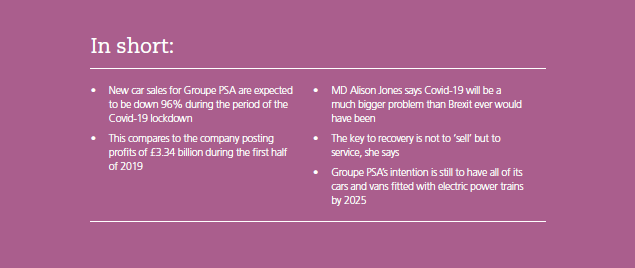Extract from Customer Focus Magazine: Issue 29 (May/June 2020)
It’s the fourth week of lockdown, and the economic impact of the coronavirus is starting to be calculated. The Office For Budget Responsibility is predicting GDP could shrink by an unprecedented 35% in Q2, and by 13% by the end of the year. And while no sector is immune, some face bigger problems than others – not least of all, the automotive sector – with new car sales being the barometer many look to for getting an assessment about the health of the economy. Yet two weeks before Customer Focus spoke to Alison Jones, UK managing director of Groupe PSA – the French multinational manufacturer that owns the Peugeot, Citroën, DS, Opel and Vauxhall brands – she was already warning investors to prepare for a whopping 96% decline in its new car sales during the lockdown period of the Covid-19 crisis.
It probably wasn’t the announcement she was anticipating making to mark her first 12 months in the role. Now though, she, like the rest of industry, has a huge task ahead of her. But if there’s one thing she’s certain of, it’s that service will never be such a precious offering. “Customer service will have to be right there at the forefront as we, and other organisations grapple with this economic crisis,” she says. “The Institute of Customer Service (of which she is a vice-president), quite rightly talks about authenticity of service, and now this has to be front and centre and unashamedly so,” she says.
When she arrived in-post, the former MD of VW passenger cars and group after-sales, and customer quality director, she said she was already “determined to increase customer service,” but as she reflects about the situation, she and other businesses find themselves in, she’s even more determined: service is what is needed now more than ever. And although it’s a rallying call that applies to all, Jones admits it’s one that has particular relevance to the car industry. “There’s still an image of mistrust about car salespeople,” she says. “Although I genuinely do think the world has moved on from that historical image, we will absolutely need to resist the temptation to aggressively ‘sell’ to customers when all this is over, in order to recover our targets.” She adds: “This means the service rules we set ourselves will be so important. When things ‘return’ I believe customers’ values will have been permanently reset. They’ll look at things differently. So how we respond as a company will be remembered.”
When she began her latest job, Jones says she was under no illusion about the service challenge she’d set herself long before anyone had ever heard of coronavirus. “The car sector is a really tricky one in many respects,” she says. “We have different brands; we have very different types of customers, with very different needs; our products are considered purchases, and alongside all this, we have a dealer franchise network, where individual businesses will have their own ideas about service levels and whether they need improving.” The upshot of this, was that when she took over the reigns last spring, she was already aware that many of the good things Groupe PSA was responsible for – for instance industry award-winning cars and vans (for comfort as well as design), and high reliability levels from a JD Power Study – weren’t being translated into good customer satisfaction scores. She says: “We had all this massive potential, but our service scores weren’t mirroring this. We were bottom quartile in The Institute’s UK Customer Satisfaction (UKCSI) survey – and so improving was, and still is, one of my key targets.”
According to Jones, where sales staff are really able to add value is in terms of the financing they can offer, the service and repair solutions they can bolt-on, and crucially the after-care that customers receive when they’ve taken ownership of their new vehicle. “Quite rightly, buying a new car is an exciting experience for many people – it’s a purchase they’ve often been dreaming about for some time. So it’s incumbent on us to ensure the experience customers have living with their car, is the same as it was for buying it,” she says.
And if there’s one thing Jones can’t be accused of, is not being thorough in terms of making sure change happens. “Before I officially started, I actually visited a few dealerships, taking in what it was that sales and service staff were doing, and how they were treating customers. I went totally under the radar, and it was an incredibly interesting experience,” she recalls. As recently as a few weeks ago, she sat at a customer service desk to hear for herself the sorts of service issues customers have – an experience, she adds, which has already seen her make improvements to some processes and procedures. “We have to be careful in making generalisations about types of common problems – because when people call up, they’re often still recalling an issue they might have had a year ago,” she explains. “But what we do want to do is understand what issues people might have, so we can make sure everything we do is done to the same standard.” Because customers don’t see dealerships as independent franchisees, Jones says she often gets messages direct, and she’s fine with this, because she also says it helps her “keep her close to customers”.
But with all the current uncertainty, what will be her key service concerns next? “The service issues that we already identified before coronavirus, are still here – chief amongst them is the commitment we’ve made in green technology,” she says. Groupe PSA has a commitment for all its cars and vans to come with an electrified power train by 2025. “For some customers, hybrid technology is something they are very familiar with; for others it’s a big area they need educating on; for another group still, they’re just not interested in the technological details, and just want to know the basics about the cost, and running costs, of the car. So customers will need an increasingly personalised experience.”
Although Jones questions whether technological changes to car design will bring about the resurgence of the salesperson as the ‘expert’ (in recent years, the relationship between salespeople and customers has equalled out, to the point where customers know just as much about what they’re buying as the salesperson), she does at least concede it will create a need for better product knowledge. “Greater know-how combined with how salespeople relate this to customers – and the personalisation they can provide – is what will single out great sales from good sales,” she says. Ways she’s responded to this include creating ‘product champions’ – people who simply explain new technologies, and are not in any way given a sales role. “These people don’t give off any pressure to buy – they’re purely there as information hubs,” she says.
Another more subtle (but no-less impactful strategy) she’s embraced, is encouraging a much wider pool of people to work for dealerships. “Sales and service have historically been tough jobs. Our network has worked quite hard to restructure the number of days people need to work, people’s bonus structures, and even bolstering part-time positions, to encourage a wider, and socially diverse pool of people to become sales agents,” she says. It was through work like this that recently saw Jones scoop the Cox Automotive Barbara Cox Woman of the Year Award in March this year. “Measures we’ve introduced include providing solutions for employing more women, who can now combine working with childcare,” she says. Just by having ‘different’, and more diverse people makes a big difference in terms of service, she argues, as customers relate better to a broader range of people.
“Even in just a short time-frame, I believe the service proposition we offer now is much better than we were able to a year ago,” she says. “I genuinely believe we’ve got fantastic service people with us now. The common feature that unites all our really great people, is that they genuinely love customer service. They love what they do, and they love providing the sort of service that people now expect. Because of this, Jones says customer service is something she wants to elevate in her sector further still, ensuring it is not to be seen as an inferior career. “Up to a point, customers will buy a product – particularly a car marque – out of historical brand loyalty.” But this unwavering advocacy, she argues, is now no longer so certain: “Brands that don’t service them as they feel they should be, will lose out. It’s as simple as that.”
Jones talked earlier about it being the way ‘companies respond’ to coronavirus that will be remembered. Right now, she says her priority is ensuring the physical health of her employees and the communities they serve is protected. “We’re already seeing our workers do volunteering; we opened up our facilities to see if they could be used for creating ventilator capacity; we’re offering free roadside assistance to anyone who works in the NHS with one of our vehicles, and we’ve committed to trying to keep our parts and workshop centres open,” she says. She adds: “In time, attention will turn to our economic health.” Until relatively recently, the group was in rude health – posting profits of€£3.34 billion for the first half of 2019, and record margins at 8.7% operating margin.
This of course, is history now. “We all thought Brexit was big, but this is something else,” she says. “People are living through something that we’ll look back on as being transformative.” But she concludes: “Yes, we have a responsibility still to our stakeholders to grow sales, but I’m clear that this shouldn’t mean doing it by being aggressive to customers. The way we communicate with customers will be telling. Customers will remember those companies that served them well. That’s the key message we all need to remember right now.”

